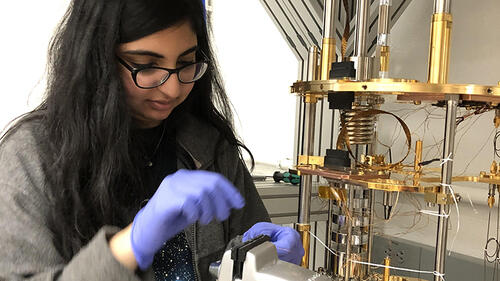
The U.S. Department of Energy (DOE) has awarded support for a 2-year pilot Research Traineeship for Diversity in Nuclear Physics program at Wright Lab. The traineeship is aimed at training and retaining a diverse cohort of next-generation scientists including underrepresented, first-generation, and low-income undergraduate students as future nuclear physicists and leaders in science.
The traineeship offers a number of undergraduates and recent college graduates research experiences prior to graduate school that include hands-on research, mentoring, workshops, immersion in the Wright Lab and Yale research communities, and networking with the national nuclear physics community. Research experiences can last for a semester, the summer, or a year.
The traineeship will build upon Wright Lab’s experience with training undergraduate and postgraduate researchers to introduce participants to the environment of a leading research university in nuclear science, leveraging the existing infrastructure and collaborations with other campus support organizations to support students through the academic and research environment.
Wright Lab professors Karsten Heeger, who is also chair of the Yale Physics Department and director of Wright Lab, and Reina Maruyama are jointly leading the new program. This pilot is done in collaboration with Yale’s Emerging Scholars Initiative Post-Bac Research Education Program (ESI PREP).
Heeger said, “This program continues the longstanding tradition of excellence in education, mentoring, and hands-on training at Wright Lab. Students will experience cutting-edge research in nuclear physics in a diverse community, develop professional skills through a series of workshops and training opportunities, advance their personal development, and receive individualized training and mentoring to pursue a career in STEM or graduate school.”
Maruyama said, “STEM efforts are most successful when people feel safe and can bring their whole selves including their own experiences and ideas to the table. I look forward to working with these future scientists.”
More about the DOE Research Traineeships to Broaden and Diversify Nuclear Physics (TBD-NP)
This pilot program is intended to support training and research experiences for members of underserved communities with the goal of increasing the likelihood that participants from underrepresented populations, such as those present at minority serving institutions (MSIs), will pursue a career in a Science, Technology, Engineering or Math (STEM) related field, particularly in Nuclear Physics. This program is informed and influenced by the recommendations in recent reports, including the American Institute of Physics TEAM-UP report.
The DOE’s Office of Nuclear Physics’ (NP) mission is to discover, explore, and understand all forms of nuclear matter and the evolution and underlying structure of our universe. NP supports a wide range of activities including experimental, theoretical, and computational research along with the development and operation of particle accelerators and advanced technologies. The ability of NP to fulfill this mission relies on the availability of a highly trained, diverse community of investigators, researchers, students and staff that provide great benefit to the nation broadly by contributing to and advancing fields such as medicine, national security, industry, and finance. Historically, the NP community has been drawn primarily from a pool of potential talent that is less diverse than the general U.S. population. It is the goal of this program to help broaden and diversify the NP community, to ensure that it is drawn from the broadest possible pool of potential nuclear physicists within the U.S., and to thereby help ensure the success of the NP mission.

